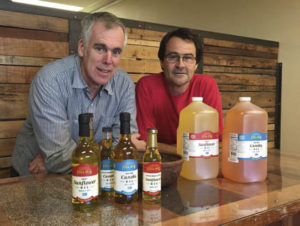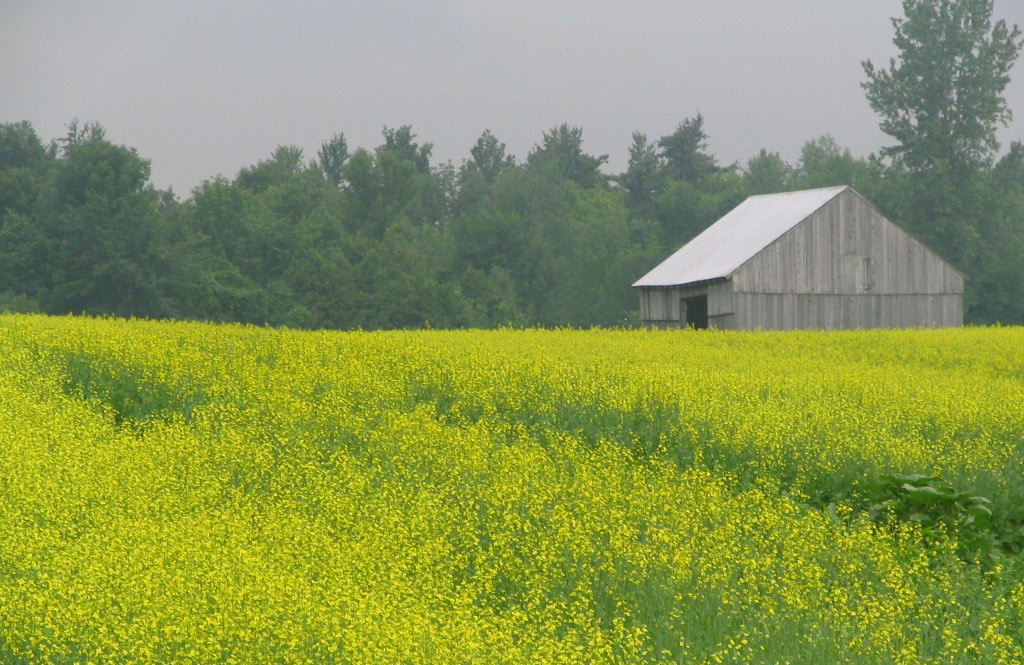Netaka White has made a career of producing useful items from raw materials, but his latest venture represents a particularly broad leap: from crushing canola and sunflower oils to generate on-farm biodiesel, to filtering and cold-pressing non-GMO streams of those oils to create tasty, aromatic, and nutritious culinary oils.

David McManus and Netaka White, co-owners of Full Sun Company with their Non-GMO Project Verified sunflower and canola oils
White and his co-founder and co-owner David McManus, an experienced renewable energy entrepreneur, operate the thriving Full Sun Company in Middlebury, Vermont. It provides hospitals, colleges, restaurants, and retailers in the Northeast with two varieties of Non-GMO Project Verified, extra-virgin oils—sunflower and canola—and it offers a non-GMO, soy-free oil meal in great demand as a feed ingredient for livestock and poultry.
Growing a sustainable regional business and non-GMO acres
Vermont has mountain-high standards when it comes to local food production. Netaka and David’s original vision was to increase non-GMO crop production and realign the Northeast’s food system to promote regional sourcing and markets. “Our first test-market batches in early 2014—grown from local seeds—sold quickly in Vermont, New York, and Boston,” Netaka recalls. “By April 2015 we were up and running in our own facility.”
Last fall, Full Sun received $200,000 from the Fair Food Fund to increase oil and meal production. Four new presses will be operating by late 2018. Netaka serves as head of operations; David, who worked for ten years in national sales with natural meat producer Applegate, is head of sales. Full Sun has five full-time employees.
While committed to recruiting regional non-GMO growers, the majority of seeds are not sourced locally. Close to 85 percent of the sunflower comes from three to four growers in Minnesota; 15 percent comes from Maine, Vermont, and New York. Ninety percent of the canola seed comes from Prince Edward Island or Ontario, Canada, with the remaining 10 percent from Maine.
“We want to get our percentages up to 50 percent from the Northeast,” Netaka said. “It takes time to build the supply and recruit growers—who might want to grow non-GMO canola or sunflower in rotation with other small grains, beans, or corn. We have to show conventional farmers that best practices, seed selection, and so forth impact profit per acre.”
Beyond attracting growers, Full Sun insists on more sustainable, regenerative agriculture practices—techniques beyond simply non-GMO verified seed selection and field segregation. These include cultivation and disking to control weeds instead of herbicides, using manure as fertilizer, planting cover crops, and prohibiting the use of desiccants to dry down crops before harvest.
“Dave and I feel that food companies can do more to help regenerate the land under the non-GMO banner and it’s our responsibility to build these transitional steps into our farmer contracts and make it financially attractive to them,” Netaka said.
Extra-special oils: extra-virgin, unrefined, cold pressed, filtered
Full Sun carefully tends to each batch of oil, seed to bottle. Each bottle is traceable to the family farmer. Taste is primary, followed by distinctive fragrance and color—along with an attractive nutritional profile of Vitamin E, low saturated fat, and omega-3s and -6s. The oils are less expensive than olive oil and a rich, full-bodied addition to salads, sautés, or dips.
“Production practices are important for their environmental impact,” Netaka said. “Our oils are cold pressed fresh daily; the automated presses run 24/5, sometimes 24/7.”
At Full Sun, everything has an end use. Oils account for 70 percent of sales revenue; meal for 30 percent. When the seed is pressed, 60 percent of the volume is meal, 35 percent oil, and 5 percent waste. The off-spec oil is even collected and sold for biodiesel production.
“There’s a big market for non-GMO feed, and it’s less expensive than organic,” said Netaka. “Consumers have increasingly high standards for animal feed… without traceability, your feed could be made with almost anything.”
Ayers Brook Goat Dairy, providing milk for Vermont Creamery, feeds its goats with Full Sun’s non-GMO oil meal, enabling them to receive non-GMO verification. Ben and Jerry’s has committed to providing all their cows non-GMO feed. Many producers want to eliminate imported soymeal from feed.
Selling feed necessitates careful management of customer demand. “As production increases—each time we add a press—we need more producers to sell the meal to,” said Netaka.
Non-GMO Project involvement
From the outset, Full Sun was committed to providing non-GMO canola oil. Organic certification may follow. “Once we had the non-GMO canola and sunflower oils sourced to launch the business, we couldn’t risk postponing it to add organic to the plan—we were unable to find local producers of organic sunflower and canola. But we’re looking forward to lining up organic growers in our region.”
Non-GMO Project verification was achieved in 2015, and the company believes the label is important to their market.
“The NGP process is very authentic and very rigorous,” added Netaka, though he said the process is “a bit too complicated and time-consuming.”
Full Sun’s mission is clear: Be profitable, and positively impact the region.
The challenges are recruiting growers and getting more acres into non-GMO and organic production; and investing time and money to market the specialty oils. Full Sun hopes to have a national brand in the next ten years.





